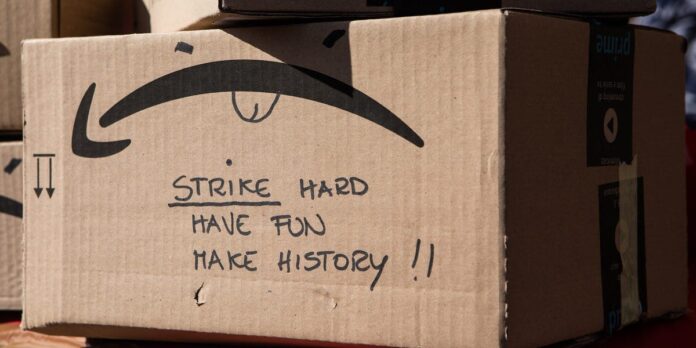- Amazon employees in 20 countries are preparing to strike or protest on Black Friday as part of the “Make Amazon Pay” campaign.
- The campaign includes a coalition of 70 organizations, including Greenpeace, Oxfam, and Amazon Workers International.
- The protests come amid mounting dissent from Amazon employees over working condition and union busting.
We are so sorry! We bumped into a system failure and couldn’t take your email this time.
Amazon employees around the world are preparing to strike on
Black Friday
in an effort to improve working conditions and demand accountability from top executives.
Workers and activists in more than 20 countries are expected to protest as part of a campaign led by “Make Amazon Pay,” a coalition of 70 trade unions and organizations including Greenpeace, Oxfam, and Amazon Workers International.
Individuals everywhere “from oil refineries, to factories, to warehouses, to data centers, to corporate offices” are expected to participate in the November 26 event, according to the campaign.
“The pandemic has exposed how Amazon places profits ahead of workers, society, and our planet,” Make Amazon Pay wrote in a list of demands shared on its website. “Amazon takes too much and gives back too little. It is time to Make Amazon Pay.”
The protests come amid growing dissent from Amazon employees over working conditions, including long hours, low pay, and complex performance review systems. Make Amazon Pay’s demands include increased salaries, better job security, and “suspending the harsh productivity and surveillance regime Amazon has used to squeeze workers.”
The coalition also calls for a “pay back to society” that includes enhanced sustainability efforts, increased transparency over data and privacy, and ending partnerships with police forces and immigration authorities that are “institutionally racist.”
In a statement, Amazon spokesperson Kelly Nantel told Insider that the company is “inventing and investing significantly” in several of the categories the campaign addresses, including climate efforts, like a commitment to reach net-zero carbon emissions by 2040 and pushes to improve competitive wages and benefits.
“These groups represent a variety of interests, and while we are not perfect in any area, if you objectively look at what Amazon is doing in each one of these areas you’ll see that we do take our role and our impact very seriously,” Nantel said.
The rise of Make Amazon Pay also follows a fraught push for unionization across the company, including most recently at an Amazon warehouse in Staten Island which filed for a union vote last month. The e-commerce giant became embroiled in controversy earlier this year after reports surfaced that it allegedly participated in union-busting tactics that may have thwarted a vote at a warehouse in Alabama.
As part of the Make Amazon Pay effort, the campaign also accused Amazon of dodging taxes. According to a ProPublica report published in June, its founder Jeff Bezos didn’t pay any income taxes between 2006 and 2018. He is currently the richest person in the world with a net worth of $210.7 billion.
“During the COVID-19 pandemic, Amazon became a trillion dollar corporation, with Bezos becoming the first person in history to amass $200 billion in personal wealth,” Make Amazon Pay wrote on its website. “Meanwhile, Amazon warehouse workers risked their lives as essential workers, and only briefly received an increase in pay.”
Make Amazon Pay was first formed in 2020 and has since helped drive a series of strikes and protests against company policies, particularly as unrest mounted during the pandemic.
“Amazon’s wealth has increased so much during the pandemic that its owners could pay all 1.3 million of its employees a $690,000 COVID bonus and still be as rich as they were in 2020,” a video states on the Make Amazon Pay website.


